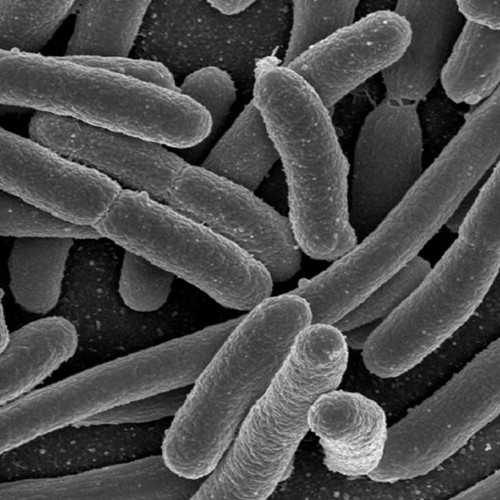E. coli Strain ALS1059
Escherichia coli cells accumulate pyruvic acid under certain growth conditions.
From the laboratory of Mark A. Eiteman, PhD, University of Georgia.
 Part of The Investigator's Annexe program.
Part of The Investigator's Annexe program.
Escherichia coli cells accumulate pyruvic acid under certain growth conditions.
From the laboratory of Mark A. Eiteman, PhD, University of Georgia.
 Part of The Investigator's Annexe program.
Part of The Investigator's Annexe program.
Specifications
| Product Type: | Bacteria |
| Name: | ALS1059 |
| Cell Type: | Bacteria |
| Organism: | Escherichia coli |
| Strain: | ALS1059 |
| Genotype: | Hfr zbi::Tn10 poxB1 Δ(aceEF) rpsLpps-4 pfl-1 ldhA::Kan arcA726::(FRT) atpFH::Cam |
| Antibiotic Resistance: | Kanamycin, chloramphenicol |
| Growth Conditions: | TYA medium, 10g/L tryptone, 5g/L NaCl, 1g/L yeast extract, 1.36 g/L sodium acetate trihydrate Na(CH3COO)?3H2O, pH adjusted to 7.0, aerobic 37C |
| Format: | Lyophilized culture |
| Storage: | Room temperature as lyophilized culture |
| Shipped: | Ambient temperature |
Documentation
Protocol Notes
- Inject 1 mL of sterile DI water into vial and gently mix.
- Use small portions of vial (liquid) contents to inoculate a sterile, liquid culture to an initial OD of 0.03-0.1. For this liquid culture, use the specified growth medium with or without an antibiotic as appropriate.
- When culture has visibly grown in liquid medium, plate on solid (Agar) growth medium and incubate at 37C. Maintain strain.
Research
| Strain | Phenotype |
| ALS974 | Accumulates lactic acid |
| ALS929 | Accumulates pyruvic acid |
| ALS1392 | Does not metabolize arabinose, glucose nor xylose |
| ALS1391 | Does not metabolize arabinose nor xylose |
| ALS1371 | Does not metabolize arabinose nor glucose |
| ALS1370 | Does not metabolize xylose nor glucose |
| ALS1074 | Does not metabolize xylose but can accumulate lactic acid from glucose |
| ALS1073 | Does metabolize glucose but can accumulate lactic acid from xylose |
| ALS1060 | Does not metabolize xylose nor glucose |
| ALS1059 | Accumulates pyruvic acid |
| ALS1058 | Does not metabolize glucose |
| ALS1048 | Does not metabolize glucose |
| ALS1038 | Does not metabolize xylose |
| ALS1054 | Accumulates pyruvic acid |
| ALS1122 | Does not metabolize xylose nor glucose |
Provider
From the laboratory of Mark A. Eiteman, PhD, University of Georgia.
References
- Y. Zhu, M. A. Eiteman, R. Altman, E. Altman, High glycolytic flux improves pyruvate production by a metabolically engineered Escherichia coli strain, Applied and Environmental Microbiology, 74(21):6649-6655 (2008) doi: 10.1128/AEM.01610-08
- A. Tomar, M. A. Eiteman, E. Altman, The effect of acetate pathway mutations on the production of pyruvate in Escherichia coli, Applied Microbiology and Biotechnology, 62, 76-82 (2003) doi: 10.1007/s00253-003-1234-6
- G. N. Vemuri, M. A. Eiteman, E. Altman, "Succinate production in dual-phase Escherichia coli fermentations depends on the time of transition from aerobic to anaerobic conditions," Journal of Industrial Microbiology and Biotechnology, 28(6), 325-332 (2002) doi:10.1038/sj.jim.7000250
- Y. Zhu, M. A. Eiteman, S. A. Lee, E. Altman, Conversion of glycerol to pyruvate by Escherichia coli using acetate- and acetate/glucose-limited fed-batch processes, Journal of Industrial Microbiology and Biotechnology, 37:307-312 (2010) doi: 10.10007/s10295-009-0675-z
- Y. Zhu, M. A. Eiteman, E. Altman, Indirect monitoring of acetate exhaustion and cell recycle improve lactate production by non-growing Escherichia coli, Biotechnology Letters, 30:1943-1946 (2008) doi: 10.1007/s10529-008-9775-5
- US Patent Numbers 7,749,740, 8,278,076 and 8,652,825.
If you publish research with this product, please let us know so we can cite your paper.


